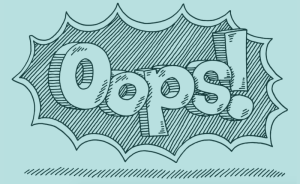
A person stares into a tablet device while touching their hand to their face in shock.
When you work for a website like Everyday Feminism, which garners a few million visitors per month, you’re bound to hear people say some weird things about your organization.
“Why do y’all like numbered lists so much?” for example.
Or the trolls’ favorite: “You’re supporting white genocide.”
But a lot of the time, they’re actual misconceptions – stuff that people assume based on how they perceive us or weird Internet urban legends that float around from one feminist Tumblr user to the next.
And it’s kind of funny.
So when, at a recent staff meeting, I jokingly suggested that maybe we should write an article a la “10 Things You Thought You Knew About Everyday Feminism (But Have No Idea),” I was met with the image of my co-workers’ jaws dropping, hands slapping desks, laughing heartily, yelling, “YES! PLEASE! YES!”
Because we like to be a little tongue-in-cheek.
But also because we want to clear the air a little bit.
We do want to be called out and called in when it’s appropriate. We’ve been called out for publishing harmful material before – which we’ve quickly rescinded, apologized for, and met about to do better going forward.
That is to say: We are listening to you. And we need you to keep talking to help hold us – all of us, as a community – accountable. Because no one is above making grave mistakes. And as an organization dedicated to reducing oppression in the world, we need to be told when we’re being oppressive.
But also, we thought y’all might like to know the truth behind several misconceptions.
So, based on our experience as staff of Everyday Feminism, here are the five weirdest things we’ve commonly heard about ourselves – and why they are, indeed, misinformed.
1. We’re White Feminists
White feminism is defined, brilliantly, by Batty Mamzelle, as “a specific set of single-issue, non-intersectional, superficial feminist practices.” It is not implying that “every white woman, everywhere, who happens to identify as a feminist” is doing it wrong, nor does it mean that “every ‘white feminist’ identifies as white.”
It is, simply, the feminism that we understand to be mainstream (and shitty) – a feminism that doesn’t value intersectionality and is primarily concerned about the issues faced by white, middle and upper class, straight, cisgender, Christian, able-bodied, thin women (aka the dominant group in the US, other than the fact that they’re women).
White feminism is actively not concerned with (and indeed minimizes!) issues primarily faced by people of color, from low-income backgrounds, who identify as queer or trans, who practice non-Christian faiths (or who don’t practice at all), who are disabled, and who are fat.
White feminism also just so happens (frustratingly) to be what’s most mainstream.
And apparently never having taken a look at our Meet the Team page, folks assume, on the basis that we’re a successful website, that we must be made up of and cater to white feminists.
Now, Everyday Feminism was founded and is run by a non-binary person of color, Sandra Kim. And she founded Everyday Feminism in order to bring the application of intersectional feminist principles into people’s day-to-day practices. That is to say, she both lives and values intersectionality.
But if folks are looking for more proof that we’re not a “white feminist” site, I’ve got you covered.
Of our six full-time and three part-time core team members:
- 78% are of color. Only two people who work for Everyday Feminism – myself included – are white.
- Two-thirds identify as trans or gender non-conforming.
- Half are somewhere along the asexual or aromantic spectrums.
- Over three-quarters openly live with one or more physical, psychological, or learning disabilities.
- One identifies as fat.
- Everyone is queer.
So we’re doing pretty okay on the intersectional representation front – and our pool of regular contributors mirrors that diversity – with the majority being people of color and LGBTQIA+.
While we’d like to say that this is the norm, even for social justice sites, it’s quite rare for broad umbrella sites like us (that is, not a POC or LGBTQ-specific site) to actually be able to state that our team composition reflects our commitment to centering marginalized voices. In fact, we also openly display that we are an affirmative action employer.
Given our team composition, we also can and do cover an extremely wide range of issues. On the menu on the front page of our site alone, we note sections for issues related to race, class, religion, bodies, and disability. And our LGBTQIA+ section actually includes articles relating to the T, the I, and the A.
And if you want a bit of a behind-the-scenes look at Everyday Feminism, here’s something that you probably don’t know: We actively prioritize people with lived experience writing about issues that affect them directly – and even have an accountability checklist to make sure our contributors stay in their own lane.
That is, unlike most other sites that value good reporting over lived experience, someone who grew up middle- or upper-class isn’t going to write about classism and the impact of poverty for Everyday Feminism.
We think that’s harmful – reifying oppression and the status quo by allowing those with the most power to dictate public perception of a marginalized experience.
And if folks do want to write about an issue from an allyship standpoint about how folks seeking to work in solidarity with marginalized groups can do better, they’re required to have their work reviewed by people who do live that experience. And those reviewers are paid for their contribution.
Could we do better? Yes. There’s always room for improvement, and we stay vigilant and proactive around looking for ways to do better. Our Contact Us inbox is always open for suggestions, and we appreciate when people point out intersections that we could be giving more visibility to.
But white feminism? Nah.
2. We Have a Lot of Money – And a Huge Staff
Here’s something you may not have known. Most of the feminist media outlets that you frequent are funded by outside investors.
They’re usually men, and usually white men, who choose to invest in pet projects in online feminism – either because they’re kick-ass and want to contribute to the downfall of their own social power, or because they see it as a fad-riding opportunity with a potentially large return on investment. Maybe it’s a little of both.
And that happens.
But we’re not one of those sites.
We’re actually an independent media organization, which a lot of folks don’t know!
That means that our income comes directly from our ad revenue. We’re bootstrapped (although we don’t support the bootstrap myth). That is to say, we run solely on the resources that we generate ourselves. (So if you want to help us out, click around a lot.)
Want another behind-the-scenes tidbit? We actually regulate those resources strongly.
If we allowed just any kind of advertising on our site, we could potentially make more money. That’s why you may visit any number of feminist publications that show objectifying imagery or diet culture-influenced advertising – because they’re taking money where they can get it.
And in a current system where traffic is at an all-time low for many sites (have you heard about that?), we sure as hell don’t blame them for taking that road.
But we don’t. Because we think that’s hypocritical of our values.
Now, sometimes a problematic brand slips through our ad service filters. But when it gets flagged for us, we ban it.
We also don’t believe in clickbait, even though we know that it works. Clickbait is the intentional use of sensational or provocative titles or content to draw in visitors. And even though it’s a proven way to get the page views that we need to stay afloat, we don’t believe in it – so we don’t use it.
So while we certainly try to pique your interest to bring you to the site and get your education on, we definitely won’t ever clickbait you.
Titles like “7 Ways Social Justice Language Can Become Abusive in Intimate Relationships” and “5 Reasons Why Non-Traditional Rape Narratives Are Important” are pretty damn straightforward.
We have such a small staff (more on that in a second) partly because we can’t create the kind of cash necessary for more from thin air. Money doesn’t grow on trees, as it were.
But we pay our staff fairly, including with good benefits. We pay all of our contributors – and whenever we can, we raise that pay. We even pay for cross-posts, which is unheard of in the online publishing industry.
But we believe that folks should be compensated for the work that they do, especially when displaying their work also helps us grow – as people and as a publication.
That is, we make do with what we’ve got. But what we’ve got isn’t a whole lot.
Because we’re actually a full-time team of only (wait for it) six people. Six people. Six people run this entire website. During our peak traffic stints, that’s less than one full-time staff member per million visitors.
And this is a relatively new development: Up until about a year-and-a-half ago, Everyday Feminism was run by two full-time staff members and one part-time editor. That’s it.
Currently, we also have three part-time social media associates who are a) the-bomb-dot-com and b) the ones who engage with you on Facebook. But those six full-time staff members and three part-time social media associates are it.
That’s all we’ve got. We’re a big site. But we’re a tiny staff.
3. We Censor People
Technically, censoring is something that only the government can do. And unfortunately, we’re not the government. (That would be cool, though. We’d do a way better job, imho.)
So no, we literally don’t have the power to censor you. We only have the power to control what we do and do not allow in our own tiny corner of the Internet. And as such, we have a strict comment policy – which has always been readily available for your perusal here.
We created a strict comment policy for a reason – and no, it’s not because we’re an echo chamber. We’re dedicated to helping folks break down and stand up to everyday oppression through an applied intersectional feminism lens. And as such, we have to practice what we preach.
We prioritize the relative comfort and safety of marginalized people talking about their experiences. We secondarily prioritize well-intentioned privileged people who are trying to do anti-oppression work. (Hint: If you get angry when people point out your privilege, you are neither well-intentioned, nor doing anti-oppression work.)
If someone is on our Facebook page, complaining that “there are more important things to worry about” or saying that “this doesn’t even happen,” their comment will be removed – because that’s invalidating to marginalized people.
If they’re privilege-explaining, their comment will also be removed. They’ve got an entire world out there where people will listen to their opinions and their devil’s advocacy; this space isn’t it. And if people are spouting anti-feminist nonsense or any kind of hate speech, they will absolutely be blocked.
But that isn’t censoring. That’s us exercising our right to create a space to our liking.
Trolls and other naysayers are more than welcome to start their own Facebook group to have the conversations that they want to have. That’s the magic of the Internet.
4. We’re Against Sex Workers
So, there’s this misinformed Tumblr post that frequently makes the rounds across social media platforms that says some objectively false things about Everyday Feminism.
It (mistakenly) declares that we’re a sex worker exclusive radical feminist (SWERF) site, based on the (false) claim that Everyday Feminism was founded by the same people who founded Polaris, an anti-human trafficking organization.
Let’s start here: We have self-identified sex workers who write for us and some of them do pro-sex work activism. We 100%, without a shadow of a doubt, support the rights of sex workers to choose to work in the sex industry. We also, of course, want to eradicate sex trafficking, commercial sexual exploitation of children and adults, and violence in the sex industry.
As we stated in this article, Everyday Feminism’s official position on the sex industry is:
We apply an intersectional, anti-oppression analysis to the sex industry and believe people who provide commercial sex should be free of violence, coercion, exploitation, criminalization, and stigmatization.
Furthermore, we believe that organizations working on ending sex trafficking and those working on the rights of sex workers need to work together to address the oppressive elements in the sex industry and in our culture regarding the sex trade, rather than being pitted against each other.
We also weren’t founded by the same people who founded Polaris – and we have no relationship with them. That’s just an outright lie that can be easily proven by anyone who checked the organization’s history and staff bios.
Sandra Kim, our founder, did work at Polaris a decade ago as a Case Manager. She provided services to women and children who had been sex trafficked in the DC area for two years.
And Derek Ellerman is a former staff member of Everyday Feminism, but he didn’t found us. He is the co-founder of Polaris, though. However, he hasn’t been a part of Polaris’ staff for almost ten years.
But that’s it.
Now, I used to work for an Atlanta-area public school system. But that doesn’t mean that Everyday Feminism is associated with the Georgia Department of Education.
Right? Of course that doesn’t make sense.
Interestingly, the Tumblr post that claims we’re SWERFs doesn’t actually mention the names of the people who supposedly founded both us and Polaris, because it’s not true.
We recognize that we need to cover topics related to the sex industry more often, and that those conversations need to be led by folks who work in that field. We’re happy to say that we’ll be publishing more on this topic soon, as this is one of many areas that we’re continually working to improve.
5. We Should Cover Everything Ever
One of the coolest things about Everyday Feminism, and one of the reasons that I was excited to join the team back when I did, is its focus on evergreen articles. I have a feeling that’s why a lot of you read us, too.
Evergreen articles are those that are always relevant because they don’t rely on current events. And most sites use a combination of these and flash topics to bring in their audiences. But we almost only write evergreen pieces.
That means that as much as we would love to cover celebrity drama on any given day or how the most recent episode of Degrassi either succeeded or failed at representing intersectional feminism, that’s simply not our beat.
We’re also, to be clear, not a news site. So while we certainly try to post about major social and political events as they happen, and maybe even write about them when we have the capacity to do so with such limited staff, that isn’t where the bulk of our energy goes.
And that’s because there are a ton of amazing sites doing that already – and we’re trying to provide you with something different.
This is also why we cover issues pertaining mostly to the United States – because that’s where most of us are located, and that’s the cultural climate that we know.
While we absolutely have readers all over the world (and we love you!), we are a US-based website, and as such, we publish US-based work. Although Western privilege absolutely exists and we don’t want to add to that, we also can’t be expected to be responsible for covering social issues and politics all over the world.
To do that responsibly and without perpetuating Western privilege, we would need to hire editors and contributors who had a deep analysis of different countries and regions across the world.
So while at some magical point in the future, it would be awesome if we had enough capacity (and money!) to cover every- and anything, we’re simply not there yet.
But we hope that you’ll keep supporting us as we make our way toward that kind of world domination – for world liberation. (I can’t wait to see what the trolls will make out of that one.)
***
Here’s the plain truth: We fucking love this work.
Every day, we wake up to work for an organization with a vision that we believe in and values that align with our own.
We get to be part of a huge community of amazing activists and advocates all over the world who want to make serious social change.
We are grateful beyond words for the opportunity that we have to create content for and interact with you. We often joke that we never want our jobs here to end.
But the Internet sure has some weird things to say about us.
And when we realized how many misconceptions about us were floating around, we wanted to take you aside to say, “Here’s the truth.”
Because although you only interact with us through a series of ones and zeros, there really are real-live people behind this site – real-live people who care so, so much about seeing and honoring your humanity, real-live people who think that we deserve the same.
So now, if you encounter any of this nonsense out there IRL, you know the truth.
[do_widget id=’text-101′]
Melissa A. Fabello, Managing Editor of Everyday Feminism, is a body acceptance activist and sexuality scholar living in Philadelphia. She enjoys rainy days, tattoos, yin yoga, and Jurassic Park. She holds a B.S. in English Education from Boston University and an M.Ed. in Human Sexuality from Widener University. She is currently working on her PhD. She can be reached on Twitter @fyeahmfabello.
Search our 3000+ articles!
Read our articles about:
Our online racial justice training
Used by hundreds of universities, non-profits, and businesses.
Click to learn more
Most Read Articles
- « Previous
- 1
- …
- 30
- 31
- 32




















